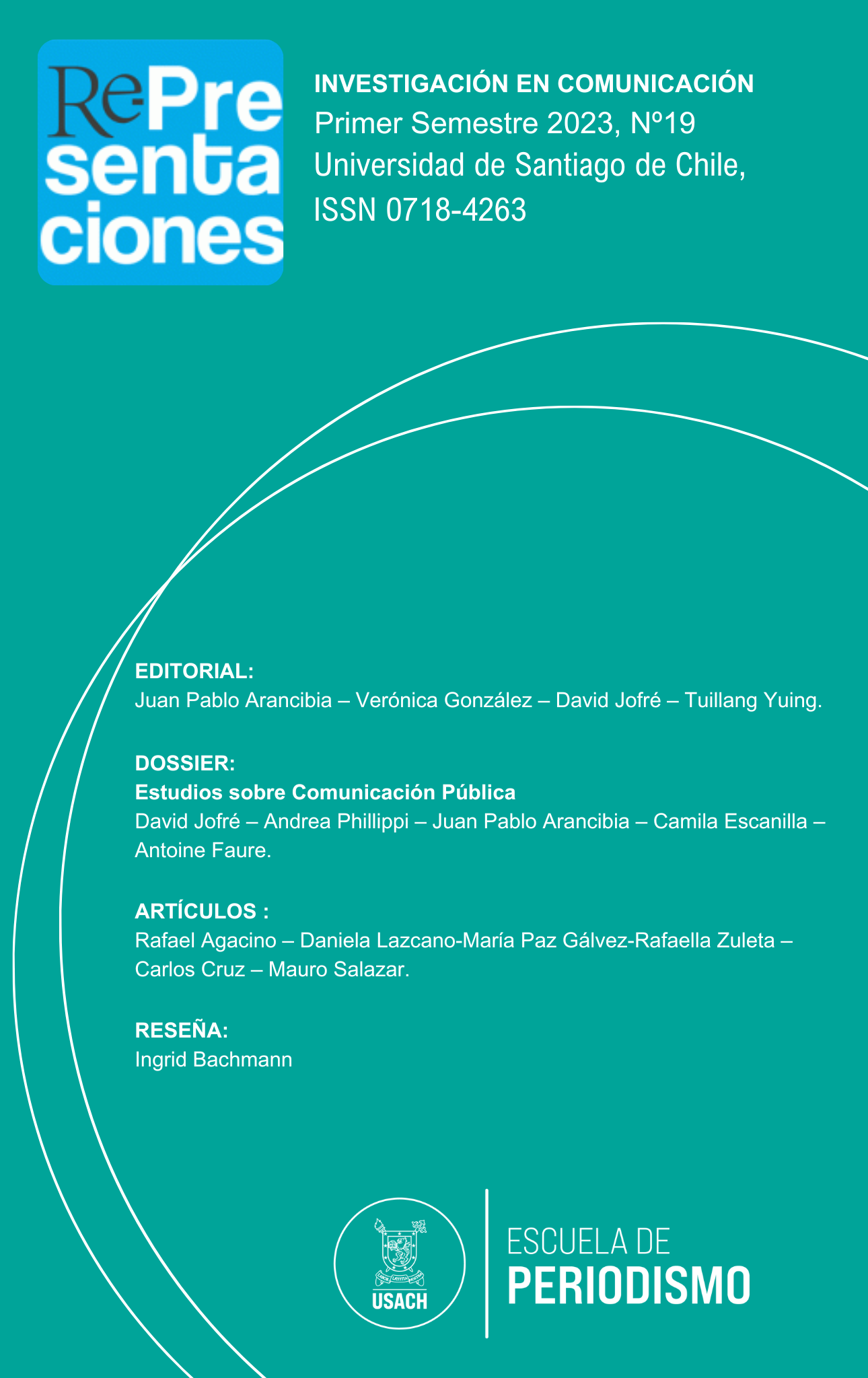Captured public communication? Private interests, media and necessary regulation in the neoliberal Chile
DOI:
https://doi.org/10.35588/rp.v0i19.6260Keywords:
Media capture, Public debate, Television, Regulation, DemocracyAbstract
Media capture is a concept originally created to understand this industry’s privatization in post-soviet countries. It refers to the process in which media lose autonomy to respond to vested interests instead of playing their informative role. This contribution aims to apply this concept to the Chilean media system, where, despite strict neoliberal guidelines that shaped it during democratization, there is a high level of ownership concentration and a lack of state-led regulation that could prevent corporate capture. This article argues that media capture is an economic dilemma with negative consequences for public communication in Chile, as it restricts journalistic pluralism and suppresses the diversity of ideas and voices necessary for deeper democratic exercises. In front of such a dilemma, the article proposes to reflect on the importance of state-led regulation to mitigate the risks of media capture.
Downloads
References
Asomah, J. (2022). «What Role do Social Accountability Actors Play in Resisting Media Capture in Sub-Saharan Africa? Evidence from Ghana». Third World Quarterly, 43 (8), 2025-43. https://doi.org/10.1080/01436597.2022.2077185
Atal, R. (2017). «Competing Forms of Media Capture in Developing Democracies». En A. Schiffrin (Ed.), In the Service of Power: Media Capture and the Threat to Democracy (pp.19-31). National Endowment for Democracy.
Beattie, G. (2020). «Advertising and Media Capture: The Case of Climate Change». Journal of Public Economics, 188. https://doi.org/10.1016/j.jpubeco.2020.104219
Becerra, M. y Mastrini, G. (2017). «Concentración y Convergencia en América Latina». Communiquer, 20. https://doi.org/10.4000/communiquer.2277
Bell, E. (2021). «Do Technology Companies Care About Journalism?». En A. Schiffrin (Ed.), How Money, Digital Platforms, and Governments Control the News (pp. 291-296). Media Capture. Columbia University Press.
Besley, T. y Prat, A. (2006). «Handcuffs for the Grabbing Hand? Media Capture and Government Accountability». American Economic Review, 96 (3), 720-736.
Cagé, J. (2016). Saving the Media: Capitalism, Crowdfunding, and Democracy. Harvard University Press.
Corrales, O. y Sandoval, J. (2005). «Concentración Del Mercado de Los Medios, Pluralismo y Libertad de Expresión». ICEI, Universidad de Chile. Santiago. http://www.comunicacion.uchile.cl/docs/corrales2005.pdf
Choi, J. P. y Yang, S. (2021). «Investigative Journalism and Media Capture in the Digital Age». Information Economics and Policy, 57. https://doi.org/10.1016/j.infoecopol.2021.100942
Cohen, N. (2021). «Nobody Home». En A. Schiffrin (Ed.), How Money, Digital Platforms, and Governments Control the News (pp. 67-79). Media Capture. Columbia University Press.
Corneo, G. (2006). «Media Capture in a Democracy: The Role of Wealth Concentration». Journal of Public Economics, 90 (1-2), 37-58. https://doi.org/10.1016/j.jpubeco.2005.08.002
Dragomir, M. (2020). Reporting Facts: Free from Fear or Favour. UNESCO. https://unesdoc.unesco.org/ark:/48223/pf0000373572
Dyck, A., Moss, D. y Zingales, L. (2013). «Media Versus Special Interests». The Journal of Law and Economics, 56 (3), 521-553.
Freedman, D. (2017). «Media Regulation». Oxford Bibliographies in Communication. https://doi.org/10.1093/obo/9780199756841-0095
Kleis, R. y Fletcher, R. (2023). «La Importancia de los Medios Públicos para los Individuos y para la Sociedad». Reuters Institute. Digital News Report 2023. https://reutersinstitute.politics.ox.ac.uk/es/digital-news-report/2023/importancia-mediospublicos-individuos-sociedad
Ledbetter, J. (2021). «Digital Payola: Policing the Open Contributor Network». En A. Schiffrin (Ed.), How Money, Digital Platforms, and Governments Control the News (pp. 104-116). Media Capture. Columbia University Press.
Ley Nº 1060 de 2014. Permite la Introducción de la Televisión Digital Terrestre. 22 de mayo de 2014. D.O. No. 29.05.2014.
Márquez-Ramírez, M. y Guerrero, A. (2017). «Clientelism and Media Capture in Latin America». En A. Schiffrin (Ed.), In the Service of Power: Media Capture and the Threat to Democracy (pp. 43-58). Washington: National Endowment for Democracy.
McQuail, D. (1992). «Media Performance: Mass Communication and the Public Interest». SAGE.
Mönckeberg, M. O. (2009). Los Magnates de la Prensa: Concentración de los Medios de Comunicación en Chile. Debate.
Mungiu-Pippidi, A. (2008). «How Media and Politics Shape Each Other in the New Europeomanian». Journal of Political Science Romanian Academic Society, 8 (1), 69-78.
Mungiu-Pippidi, A. (2012). «Freedom without Impartiality: The Vicious Circle of Media Capture». En P. Gross. y K. Jakubowicz (Eds.), Media Transformations in the PostCommunist World (pp. 33-48). Lexington Books.
Nelson, M. (2021). «A Global Strategy for Combating Media Capture». En A. Schiffrin (Ed.), How Money, Digital Platforms, and Governments Control the News (pp. 213-231). Media Capture. Columbia University Press.
Noam, E. (2016). «National Media Concentrations Compared». En E. Noam (Ed.), Who Owns the World's Media? Media Concentration and Ownership around the World. Oxford Academic Online. https://doi.org/10.1093/acprof:oso/9780199987238.003.0032
Petrova, M. (2008). «Inequality and Media Capture». Journal of Public Economics, 92 (1-2), 183-212.
Ruiz-Tagle, P. (2011). «Propiedad de los Medios y Principios de Intervención del Estado para Garantizar la Libertad de Expresión en Chile». Revista de Derecho (Coquimbo), 18 (2), 347-59. http://dx.doi.org/10.4067/S0718-97532011000200012
Salinas, C. Jara, R. Stange, H. y Del Valle, C. (2015). «Los Desafíos de la Integración y el Pluralismo: La Prensa Nacional y Regional en Chile. Chasqui». Revista Latinoamericana de Comunicación, 130, 313- 328.
Schejter, A. (2018). «25. Media Regulation and Policy». En P. Napoli (Ed.), Mediated Communication (pp. 471-490). De Gruyter Mouton. https://doi.org/10.1515/9783110481129-026
Schiffrin, A. (2017). «Introduction». En A. Schiffrin (Ed.), In the Service of Power: Media Capture and the Threat to Democracy (pp. 1-8). Washington: National Endowment for Democracy.
Schiffrin, A. (2021). «Introduction». En A. Schiffrin (Ed.), How Money, Digital Platforms, and Governments Control the News (pp. 3-22). Media Capture. Columbia University Press.
Sorj, B. (2012). Medios de Comunicación y Democracia: Más Allá de la Confrontación entre Gobiernos y Empresas. Catálogos.
Stigler, G. J. (1971). «The Theory of Economic Regulation». The Bell Journal of Economics and Management Science, 2 (1), 3-21. https://doi.org/10.2307/3003160
Stiglitz, J. (2017). «Toward a Taxonomy of Media Capture». En A. Schiffrin (Ed.), In the Service of Power: Media Capture and the Threat to Democracy (pp. 9-17). National Endowment for Democracy.
Sunkel, G. y Geoffroy, E. (2001). Concentración Económica de los Medios de Comunicación. LOM.
Sunkel, G. y Geoffroy, E. (2002). «Concentración Económica de Los Medios de Comunicación: Peculiaridades Del Caso Chileno». Comunicación y Medios, 13, 135-50. https://doi.org/10.5354/0719-1529.2011.12985
UNESCO (2005). Convención sobre la Protección y la Promoción de la Diversidad de las Expresiones Culturales. División de las Expresiones Culturales y las Industrias Creativas. https://unesdoc.unesco.org/ark:/48223/pf0000142919_spa
UNESCO (2014). Tendencias Mundiales en Libertad de Expresión y Desarrollo de los Medios: Situación Regional en América Latina y el Caribe. Oficina Regional de Ciencias de la UNESCO para América Latina y el Caribe. https://unesdoc.unesco.org/ark:/48223/pf0000229042
Vaidya, S. y Gupta, R. (2016). «Corruption Via Media Capture: The Effect of Competition». Southern Economic Journal, 82 (4), 1327-48.
Van Cuilenburg, J. A. y McQuail, D. (2003). «Media Policy Paradigm Shifts. Towards a New Communications Policy Paradigm». European Journal of Communication, 18, 181. https://doi.org/10.1177/0267323103018002002
Downloads
Submitted
2023-08-04Published
Issue
Section
License
Copyright (c) 2023 David Jofré Leiva, Alejandra Phillippi

This work is licensed under a Creative Commons Attribution 4.0 International License.









